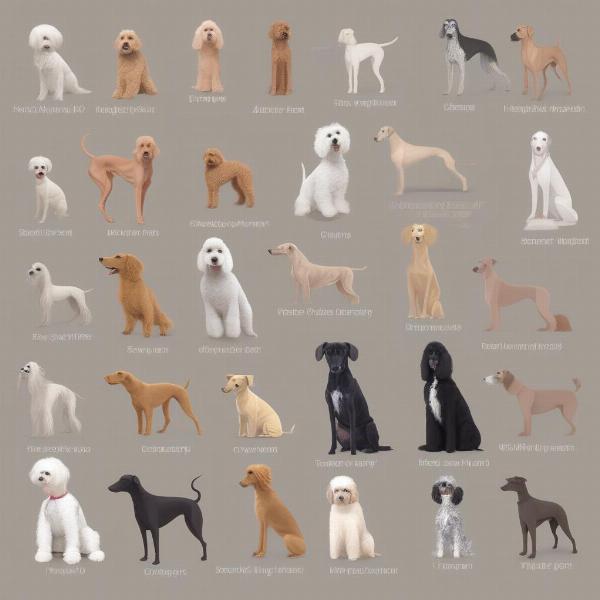Single coat dog breeds are becoming increasingly popular among dog lovers for a variety of reasons, including their lower shedding tendencies and often easier grooming routines. Understanding the characteristics and specific needs of these breeds is crucial for providing them with the best possible care. This guide will delve into the world of single-coated dogs, exploring their unique qualities, advantages, and considerations for prospective owners.
What are Single Coat Dog Breeds?
Unlike double-coated breeds which have a dense undercoat for insulation and a topcoat for protection, single-coated breeds have only one layer of fur. This often results in less shedding, although the amount can vary depending on the specific breed. Single coated dogs can be short-haired like Greyhounds or long-haired like Maltese, but the defining feature is the lack of that fluffy undercoat. This can make them a good choice for people with allergies, though it’s important to remember that no dog breed is truly hypoallergenic. Understanding the difference between single and double coats is essential when choosing the right breed for your lifestyle and living environment.
 Examples of Single Coat Dog Breeds
Examples of Single Coat Dog Breeds
Advantages of Owning a Single Coat Dog
One of the biggest draws of single coat dog breeds is their reduced shedding. While they still shed, it’s often significantly less than double-coated breeds, meaning less fur on your furniture and clothes. Grooming is typically easier as well, often requiring less frequent brushing and bathing. Single-coated breeds are also less prone to matting, which can be a painful and time-consuming issue for double-coated dogs.
Popular Single Coat Dog Breeds
There’s a wide variety of single-coated breeds to choose from, each with their own unique personality and needs. Some popular choices include:
- Greyhounds: Known for their speed and elegance, Greyhounds are surprisingly low-maintenance despite their size.
- Maltese: These small, fluffy white dogs are affectionate companions and relatively easy to groom.
- Poodles: Highly intelligent and hypoallergenic, Poodles come in three sizes (standard, miniature, and toy) and are known for their distinctive curly coats.
- Whippets: Similar to Greyhounds but smaller, Whippets are gentle and loving dogs who enjoy both activity and relaxation.
- Yorkshire Terriers: These tiny but tenacious dogs are known for their long, silky coats that require regular brushing.
Grooming and Care for Single Coat Dogs
While grooming for single coat dogs is generally easier, it’s still essential for their health and well-being. Regular brushing helps to distribute natural oils, keeping their coat healthy and shiny. Bathing frequency depends on the breed and lifestyle, but over-bathing can strip their skin of essential oils, leading to dryness and irritation.
Are Single Coat Dogs Better for Allergies?
While no dog breed is truly hypoallergenic, single coat dogs are often a better choice for allergy sufferers. Because they lack an undercoat, they produce less dander, which is the primary allergen in dogs. However, it’s important to spend time with a dog before bringing them home to see if your allergies are triggered.
Conclusion
Single coat dog breeds offer a variety of advantages, including reduced shedding and easier grooming. With a wide range of breeds to choose from, there’s a single-coated dog to fit almost any lifestyle. By understanding their unique needs and characteristics, you can ensure a long, happy, and healthy life for your single-coated companion. Remember to research specific breeds thoroughly to find the perfect match for you.
FAQ
- Do single coat dogs shed at all? Yes, all dogs shed to some extent, but single coat dogs generally shed less than double coated breeds.
- Are single coat dogs hypoallergenic? No dog is truly hypoallergenic, but single coat dogs produce less dander, which is a common allergen.
- What are some examples of small single coat dog breeds? Maltese, Yorkshire Terriers, and Miniature Poodles are examples of small single coat breeds.
- Do single coat dogs get cold easily? Yes, they can be more sensitive to cold weather than double coated breeds, so you may need to provide them with a sweater or coat during colder months.
- How often should I groom a single coat dog? Grooming frequency depends on the breed and their individual coat type, but generally, weekly brushing is recommended.
- Are single coat dogs good for first-time owners? Many single coat breeds are relatively easy to care for, making them a good choice for first-time owners. However, it’s important to research each breed’s specific needs and temperament.
- What are the health concerns associated with single coat dogs? Health concerns vary by breed, but some single coat breeds are prone to certain skin conditions. Regular veterinary checkups are important for all dogs.
ILM Dog is your trusted partner in providing expert guidance on dog breeds, health, training, nutrition, grooming, and much more. We offer reliable and practical advice for dog owners of all experience levels, catering to diverse cultural backgrounds and global perspectives. From selecting the right breed to ensuring optimal health and well-being, ILM Dog is dedicated to helping you navigate every aspect of dog ownership. Contact us today for personalized support! Email: [email protected], Phone: +44 20-3965-8624.